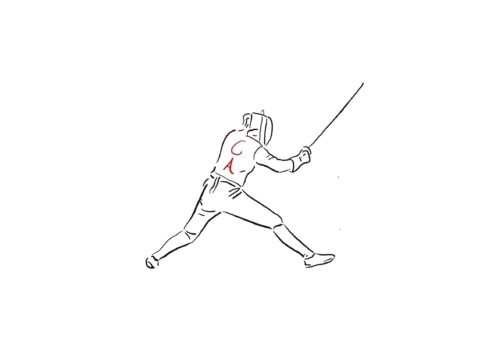Jessica Guo ’27 from Toronto, Canada, started fencing at six years old. After watching her older sister and brother fence, she decided to try her hand. Guo quickly rose to the top of the rankings in Canada and competed in the U.S. early on in her fencing career. She started fencing in international competitions by the age of 14. Deciding between Princeton, Columbia, and Harvard for college, she ultimately chose Harvard due to her love of Boston and the fencing team. By the time she arrived at Harvard, she had already competed at the 2020 Tokyo Olympics and won two Cadet World Championship titles. Now a member of Harvard’s fencing team, Guo has been a key part of the team’s success as their season concluded this year with winning the NCAA Division 1 National Championship trophy.
Now she’s going to her second Olympics. Guo competed in the Summer 2020 Tokyo Olympics at the age of 15, held in 2021 due to the COVID-19 pandemic. Guo reflected on her experience in Tokyo, explaining, “It was kind of bad because it was [after] COVID year, so I didn’t go to opening ceremonies because I didn’t want to get COVID and not be able to compete. And then we just had to get COVID tested every day, and you couldn’t really do anything—like you couldn’t leave the village. But, I mean, competing itself was pretty fun,” she explained. Guo reached the round of 16 in the individual foil event and helped Team Canada finish 5th in team foil.
Now she’s returning to the Olympics with more experience under her belt and a more typical Olympic experience to look forward to. Guo explained how the process of getting into the Olympics was an intense year-long process. Guo competed in at least eight competitions abroad. She and three other Canadian teammates fight to qualify as a team, and once they are granted the team spot, they are given three individual spots for the four of them. Guo, who received one of those spots, will be competing for a medal individually as well as for the team. She described this journey to the games as different from her previous one. “It wasn’t as intense as the first one because [the qualification process] was pretty close in the qualifications for the Tokyo Olympics, but for the Paris Olympics, we were pretty far ahead.”
“I’m looking forward to just interacting with a bunch of people and interacting with all the Canadian athletes because, for my first Olympics, you were kind of just quarantined in your room,” she explained. “Also just getting to visit the city because I’m sure there’s a lot of fun events and hanging out with family.” Since her family was not allowed to attend the events in Tokyo due to pandemic restrictions, she is excited to get the opportunity to experience the games with them this year.
While matchups for the summer games are not yet decided, it is possible Guo will meet familiar opponents on the strip. When asked who her role model is, Guo answered with 29-year-old American fencer Lee Kiefer. “She’s just really good at fencing. I mean I’ve always looked up to her.” In the 2019 Pan American Games in Lima, Peru, Guo earned a silver medal in individual foil after losing to Keifer in the final. Later in Tokyo, Kiefer became the first American to win individual gold in foil. Kiefer and Guo have both committed to the 2024 games, setting up a potential bout between the two. She may also end up competing against Harvard teammate Lauren Scruggs ’25 in the games. “She’s also qualified, but for the U.S., so we’re going to possibly be competing against each other at the Olympics, so that’s gonna be exciting.”
When asked about her expectations for the games, she said, “I don’t really have any goals going into it. I just don’t want to go back home being like, ‘I should have done this’ or ‘I should have done that.’ But, I think I just want to try my best and just come back with no regrets.”
Guo has fencing practice five days a week, three hours per day, while additionally studying neuroscience on the pre-med track. While fencing is a big part of her life, so are her studies. Despite her frequent international travels, Guo says she feels well-supported in balancing academics and her fencing career. “I just talked to my professors a bunch. They know the situation. And if I just communicate really well, they’re pretty accommodating.”
Giving some advice to the younger fencers, Guo’s biggest touching point was adaptability. “I think adaptability is the biggest one because you have to adapt during a bout, and there’s a lot of changes to be made.” As for her career in fencing, she is already looking at the 2028 Games in Los Angeles but is not sure where school might take her in the meantime. Medical school could play a role in her ultimate decision. “It depends how busy I am for that, but I’m planning to [continue fencing] but…also ready to not.”
Andrew Morrissey ’26 (ajmorrissey@college.harvard.edu) and Denny Gulia Janovski ’26 (dguliajanovski@college.harvard.edu) write Sports for the Independent

